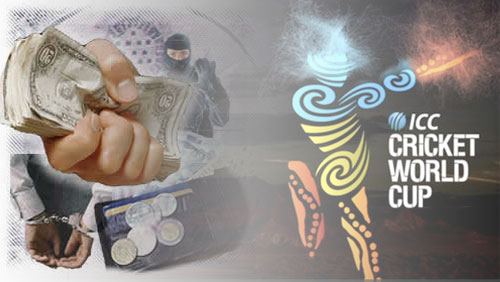The New Zealand Police have taken active steps in tightening their fight against potential match fixing at next year’s Cricket World Cup by signing a memorandum of understanding (MoU) with the International Cricket Council. Police commissioner Mike Bush and ICC Anti-Corruption and Security Unit chief Sir Ronnie Flanagan signed the MoU, putting in place a system that allow both parties to share information and expertise to help protect the games at the Cricket World Cup in February and March 2015.
 The signing of the MoU came less than a week after New Zealand’s Parliament passed the Crimes (Match fixing) Amendment Bill.
The signing of the MoU came less than a week after New Zealand’s Parliament passed the Crimes (Match fixing) Amendment Bill.
Superintendent Sandra Manderson, the New Zealand Police’s national operation commander for the ICC Cricket World Cup 2015 and the FIFA U20 World Cup 2015 called the signing of the MoU as an important step in formalizing agreement between the two sides.
“The ICC Anti-Corruption and Security Unit and Interpol have both described the Crimes (Match-fixing) Amendment Bill as world leading legislation and believe it will give police a crucial tool to protect the integrity of New Zealand sport,” Masterson said. “Police will now have greater powers to investigate corruption in sport in the same way that we investigate other criminal activity.”
The bill, which is scheduled to take into effect on December 15, 2014, also comes at a time when a UK survey revealed that professional footballers and cricketers are three times more likely to have gambling problems than other young men. Identifying this group and being able to help those in need of assistance could go a long way in preventing future incidents of match fixing in football and cricket games, especially with the latter’s premier tournament on the horizon.
Meanwhile, New Zealand’s biggest investigation tied to its gambling history has concluded with the arrest of four individuals who are now facing serious fraud charges. The investigation, called Operation Chestnut, began in June 2012 to investigate $30 million gaming grants made buy the New Zealand Community Trust, Infinity and Bluegrass trusts since 2006. During the course of the investigation, investigators found that the country’s racing industry and had some alleged connections with trusts supportive of racing clubs in arranging illegal transactions.
The four men arrested for their involvement in the case are prominent racing figures Mike O’Brien and Patrick O’Brien, bankrupt hospitality consultant Paul Max, and a former gaming inspector whose identity was not revealed for security measures.
According to the investigation, one of these four men is accused of negotiating deals between trusts running pokies in the country and racing clubs. Once a deal is hammered down, the so-called middle-man would receive a finder’s fee for setting up the deals. The problem with that is it’s illegal in New Zealand for anyone involved in running a venue with pokie machines from influencing cash flow, or in this case, receive money or kickbacks in return for grants.
According to New Zealand’s Stuff publication, all four individuals face more than 20 charges of obtaining by deception with each person facing around seven years of jail time. Not surprisingly, the four individuals have denied their involvement in the case and are expected to fight the charges levied against them.
The first court appearance for all involved has been scheduled on February 2015.





